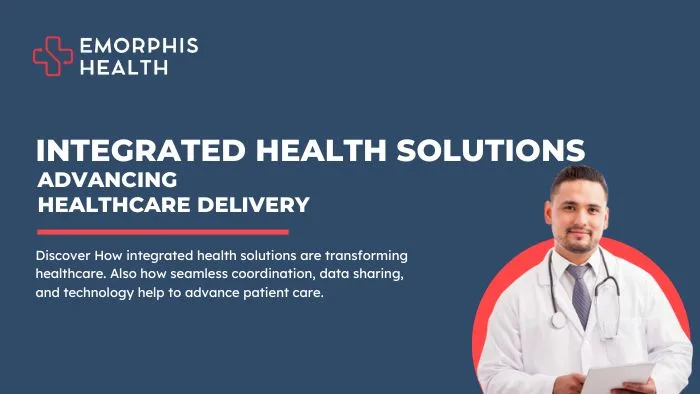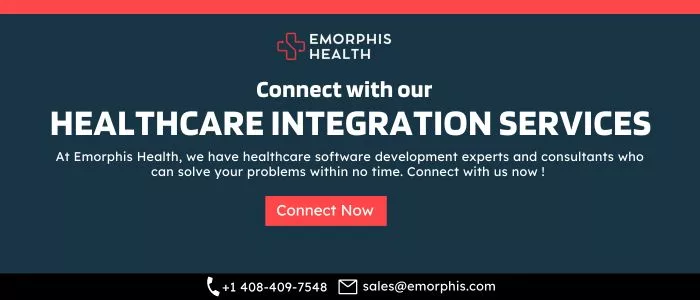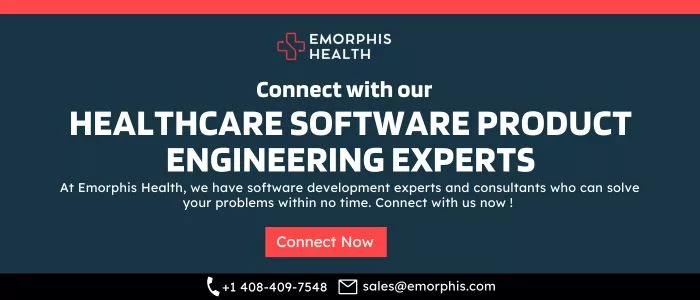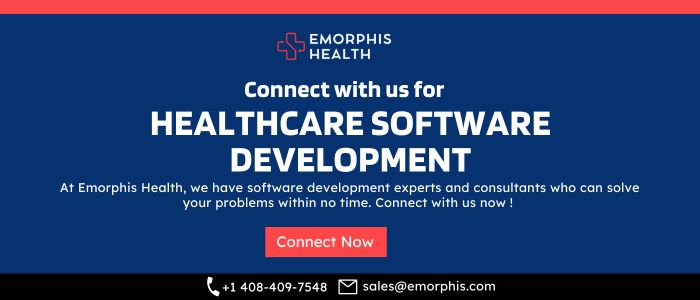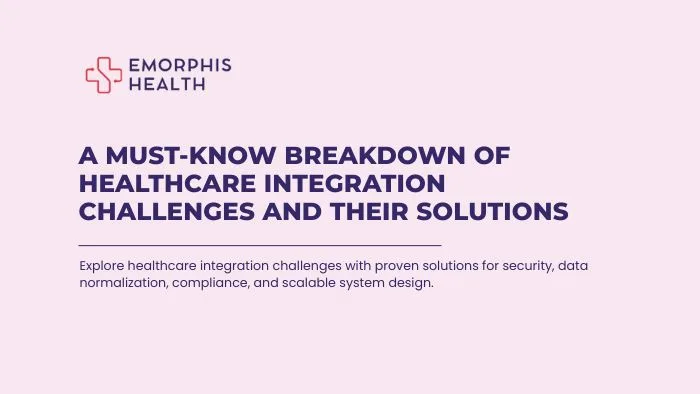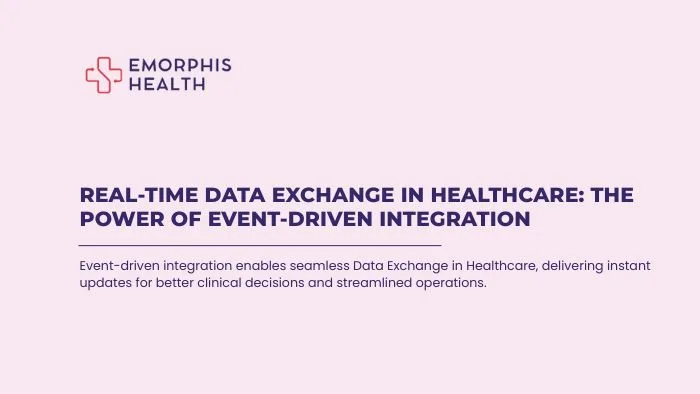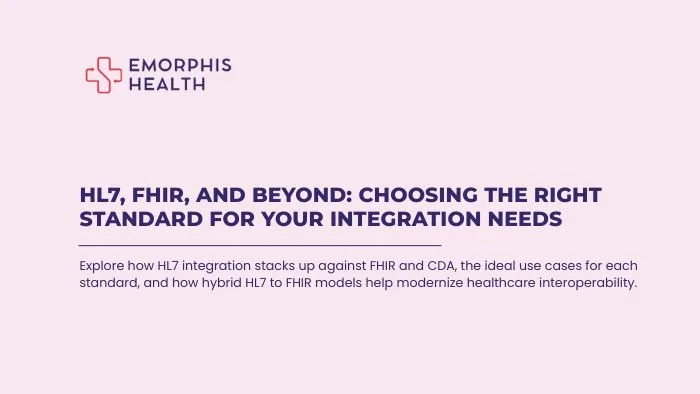Introduction of Integrated Health Solutions
See Contents
- 1 Introduction of Integrated Health Solutions
- 2 The Need for Healthcare Integration
- 3 Key Components of Integrated Health Solutions
- 4 Technology-driven Healthcare Integration
- 5 Benefits of Healthcare Integration
- 6 Policy and Regulation
- 7 Development of Integrated Care Solutions for Hospitals
- 8 Custom Integrated Healthcare Management Software
- 9 Development of Integrated Healthcare Mobile Solutions
- 10 Future Trends in Integrated Healthcare System
- 11 Conclusion
The concept of integrated health solutions has gained prominence. In fact, these solutions represent a holistic approach to healthcare, where various components seamlessly work together to improve patient care. Let us delve into the world of integrated healthcare solutions, defining the concept, also exploring its significance in modern healthcare, and understanding the trends in its development.
Defining Integrated Health Solutions
Integrated health solutions, often referred to as integrated healthcare solutions also integrated medical solutions, encompass a comprehensive approach to healthcare delivery. At its core, this concept revolves around the seamless coordination of various healthcare services, moreover, technologies, and resources to provide a unified and patient-centric experience. In essence, it breaks down the traditional silos in healthcare, fostering collaboration among different stakeholders such as physicians, hospitals, also other healthcare providers. The goal is to ensure that patients receive the right care at the right time, with all relevant information accessible when needed.
Significance in Modern Healthcare
The significance of integrated healthcare solutions in the context of modern healthcare cannot be overstated. In fact, with the advancement of medical technology and the increasing complexity of healthcare systems, the need for a more coordinated and patient-focused approach has become paramount. Integrated health systems and services can lead to improved patient outcomes, reduced healthcare costs, also an enhanced overall patient experience. Patients benefit from the convenience of having their healthcare information accessible at any point in their care journey, also reducing redundancy, and minimizing errors.
Integrated Health Solutions Development Trends
As the healthcare landscape continues to evolve, so do the trends in integrated health solutions. In fact, one of the prominent trends is the use of technology, including electronic health records (EHRs), telemedicine, and data analytics, to streamline and enhance the integration process. Moreover, mobile solutions for healthcare, often referred to as integrated healthcare mobile solutions, are becoming more prevalent, allowing patients and providers to access essential health information on the go. Additionally, a shift towards a value-based care model emphasizes the importance of integrated healthcare, focusing on the quality of care and patient outcomes rather than the volume of services.
These trends indicate that integrated healthcare solutions are poised to play an even more significant role in the future of healthcare, further improving care delivery, patient engagement, and moreover healthcare efficiency. As a matter of fact, the shift towards a more interconnected and collaborative healthcare system is a promising development that stands to benefit patients and healthcare providers alike.
The Need for Healthcare Integration
In the ever-evolving landscape of healthcare, the need for healthcare integration has become increasingly apparent. In fact, to understand this necessity better, let’s explore the challenges within the healthcare system and the rationale for pursuing integration.
Challenges in the Healthcare System
Healthcare systems worldwide face a multitude of challenges, in fact, many of which can be mitigated through integration. These challenges include:
- Fragmented Information: Patient information is often scattered across various healthcare providers and systems, also making it difficult to access comprehensive medical records. This may result in diagnostic and treatment inaccuracies.
- Inefficient Communication: Healthcare providers often work in silos, leading to inefficiencies in communication and moreover care coordination. These inefficiencies can result in delayed or duplicated services.
- Data Security Concerns: As healthcare becomes more digitized, data security is a growing concern. In fact, ensuring that patient data is kept secure and confidential is paramount.
- Rising Healthcare Costs: The cost of healthcare is steadily increasing hence integration can help streamline processes, reduce duplication, and ultimately lead to cost savings.
Rationale for Integration
Given these challenges, the rationale for healthcare integration becomes evident:
- Improved Patient Care: Integration allows for the seamless exchange of patient information among healthcare providers. In fact, this enables a more complete understanding of a patient’s medical history and needs, leading to better-informed decisions and, ultimately, improved care.
- Enhanced Care Coordination: Integration breaks down communication barriers between different healthcare entities, also ensuring that all providers are on the same page regarding a patient’s treatment plan. This leads to better-coordinated care and faster decision-making.
- Data Security and Privacy: Integrated healthcare systems can implement robust security measures to protect patient data, ensuring it remains confidential and also, protected from unauthorized access.
- Cost-Efficiency: Through streamlined processes and reduced duplication of services, integration can contribute to cost savings in healthcare, benefiting both patients and providers.
Overall, the need for healthcare integration is driven by the desire to overcome the challenges within the healthcare system, ultimately leading to improved patient care, enhanced care coordination, data security, and cost-efficiency. Integration serves as a solution to many of the obstacles faced by the healthcare industry and holds the promise of a more effective and patient-centered approach to healthcare delivery.
Key Components of Integrated Health Solutions
Integrated healthcare solutions are built upon several key components that collectively transform healthcare delivery. Let’s delve into these essential elements in depth.
1. Technology Integration
Technology integration is at the core of integrated health solutions. In fact, it involves the seamless incorporation of various healthcare technologies into a unified system. This component encompasses the use of electronic health records (EHRs), telemedicine, also other digital tools that allow healthcare providers to access and share patient data more efficiently. Moreover, by bringing technology into the mix, healthcare systems can operate with greater accuracy and speed.
2. Data Sharing and Healthcare Interoperability
Data sharing and Healthcare interoperability are fundamental to integrated health solutions. This component, in fact, focuses on the ability of different healthcare systems and providers to exchange information smoothly. Also, healthcare interoperability standards like HL7 and FHIR facilitate data compatibility and integration, ensuring that critical patient data is accessible across the healthcare ecosystem. This enables healthcare professionals to make well-informed decisions based on complete and also up-to-date patient information.
Read more about Interoperability in Healthcare
3. Collaborative Care
Collaborative care is a cornerstone of integrated health solutions. This, in fact, encourages healthcare professionals from various disciplines and specialties to work together as a cohesive team. Through shared care plans and open communication, collaborative care ensures that patients receive comprehensive and also, coordinated treatment. This approach fosters a sense of unity among healthcare providers and in fact, leads to better patient outcomes.
4. Patient-Centered Approach
A patient-centered approach is a pivotal component of integrated health solutions. It places the patient at the center of healthcare decision-making. Integrated systems empower patients by granting them access to their own health information and involving them in the decision-making process. By prioritizing the patient’s needs, values, and preferences, healthcare becomes more personalized and focused on individual well-being.
Overall, the key components of integrated health solutions encompass technology integration, data sharing, collaborative care, and a patient-centered approach. By combining these elements, healthcare systems can provide more efficient, coordinated, and patient-focused care, ultimately improving the overall quality of healthcare delivery.
Technology-driven Healthcare Integration
Technology-driven healthcare integration initiatives and solutions are of immense significance in today’s healthcare landscape. They play a pivotal role in transforming healthcare delivery, improving patient care, and enhancing overall efficiency within the healthcare system. The seamless integration of technology, from electronic health records to telemedicine, enables healthcare providers to access and share critical patient data more efficiently.
This not only leads to better-informed clinical decisions but also ensures that patient information is readily available across the care continuum. Moreover, technology-driven integration enhances care coordination, reduces duplication of services, and streamlines healthcare processes, contributing to cost savings and improved patient outcomes.
As healthcare continues to evolve, these initiatives serve as the foundation for a more connected, patient-centric, and technologically advanced healthcare system, ultimately benefiting both patients and healthcare providers alike.
Top Technology-driven Healthcare Integration Solutions
- Electronic Health Records (EHRs): EHR systems allow for the digital storage and sharing of patient health records, enabling seamless information exchange among healthcare providers.
- Health Information Exchange (HIE): HIE platforms facilitate the secure exchange of patient data across different healthcare organizations, promoting care coordination.
- Telemedicine and Telehealth: Telehealth technologies enable remote consultations and telemonitoring, connecting patients and providers irrespective of geographic location.
- Clinical Decision Support Systems (CDSS): CDSS utilizes technology and algorithms to assist healthcare professionals in making clinical decisions, and enhancing patient care.
- IoT in Healthcare: Internet of Things devices like wearable health trackers and remote monitoring tools provide real-time patient data and support data integration.
- Healthcare Interoperability Standards (e.g., HL7, FHIR): These standards ensure data compatibility and exchangeability across various healthcare systems and applications.
- Population Health Management Tools: Technology-driven tools help healthcare organizations track and manage the health of specific populations, enabling proactive care.
- Artificial Intelligence (AI) and Machine Learning: AI-driven algorithms analyze vast healthcare datasets to predict disease trends, optimize resource allocation, and personalize treatment plans.
- Blockchain Technology: Blockchain ensures secure and transparent data sharing while maintaining patient privacy and data integrity.
Some more integrated healthcare solutions
- Healthcare Mobile Apps: Mobile applications empower patients to manage their health, access medical records, and communicate with healthcare providers.
- Remote Patient Monitoring (RPM): RPM solutions enable continuous tracking of patient vitals, offering real-time data for healthcare providers.
- Telepharmacy Solutions: Technology-driven pharmacy services enable remote medication management and consultation.
- Virtual Reality (VR) and Augmented Reality (AR) in Healthcare: VR and AR technologies find applications in medical training, therapy, and visualization.
- Robotics in Healthcare: Robots are used in surgeries, rehabilitation, and patient assistance, streamlining healthcare delivery.
- Data Analytics and Business Intelligence: Advanced analytics tools help healthcare organizations derive insights from large datasets to improve patient care, optimize operations, and reduce costs.
- 3D Printing in Healthcare: 3D printing technology is used to create patient-specific implants, prosthetics, and medical models for surgery planning.
- Genomics and Precision Medicine: Genomic technology contributes to personalized medicine, tailoring treatment plans based on a patient’s genetic profile.
- Cybersecurity Solutions: Robust cybersecurity measures are critical to protect healthcare data and ensure the privacy of patient information.
- Cloud Computing: Cloud-based solutions facilitate data storage, sharing, and scalability for healthcare organizations.
- Machine-to-Machine (M2M) Communication: M2M technology enables devices and machines to communicate and share data, supporting healthcare systems.
- HL7 Integration: Ensuring Seamless Healthcare Data Exchange with HL7 Standards
- EDI X12 Integration: Streamlining Administrative Data in Healthcare through EDI X12 Integration
- ERP Integration Solutions in Healthcare: Optimizing Financial and Operational Efficiency
- Achieving MU2 Compliance through Integration: Meeting Meaningful Use Stage 2 Requirements
- Healthcare Application Integration: Connecting the Dots in Modern Healthcare Systems
- Healthcare System Integration Support Services: A Necessity for Seamless Healthcare Operations
- RFID Data Integration in Healthcare: Transforming Asset Management and Patient Safety
Benefits of Healthcare Integration
Integrated healthcare solutions offer a multitude of benefits that enhance the healthcare experience for patients and providers alike. Let’s delve into the key advantages of integration:
A. Improved Patient Outcomes
Integrated healthcare solutions are fundamentally designed to improve patient outcomes. By ensuring that healthcare providers have access to comprehensive patient data and fostering better communication and collaboration, integration enables more informed clinical decisions. This results in a higher quality of care, timely interventions, and better health outcomes for patients. Whether it’s streamlining treatment plans or preventing medical errors, integrated systems play a crucial role in keeping patients healthier.
B. Cost Reduction
Cost reduction is another significant benefit of integrated health solutions. Through streamlined processes, reduced duplication of services, and improved care coordination, healthcare organizations can achieve cost savings. This is particularly important in the context of rising healthcare costs. By optimizing resource allocation and reducing unnecessary expenses, integration contributes to the financial sustainability of healthcare systems and, in turn, can lead to more affordable care for patients.
C. Enhanced Patient Experience
An enhanced patient experience is a key outcome of integrated healthcare solutions. Patients benefit from the convenience of having their healthcare information accessible at any point in their care journey. This not only reduces the burden of repeating medical histories but also empowers patients to actively participate in their own care. With a more patient-centric approach, integrated healthcare solutions prioritize the individual needs and preferences of patients, resulting in a more personalized and satisfactory healthcare experience.
Overall, the benefits of integration in healthcare are vast and encompass improved patient outcomes, cost reduction, and an enhanced patient experience. Integrated health solutions hold the potential to create a healthcare system that is not only more efficient but also more patient-centered, ultimately improving the overall quality of care delivery.
Policy and Regulation
In the complex realm of healthcare integration, policy, and regulation play a critical role in shaping the landscape. This section will explore the impact of healthcare policies on integration and the regulatory considerations that healthcare organizations must navigate.
Healthcare Policies Impacting Integration
Healthcare policies, in fact, have a profound influence on the implementation of integrated health solutions. As a matter of fact, policymakers and government bodies establish guidelines and regulations to ensure the safety and quality of healthcare services. Moreover, these policies often address data privacy, security, and healthcare interoperability standards. Also, compliance with these policies is essential for healthcare organizations to avoid legal issues and uphold patient trust.
Regulatory Considerations
Healthcare organizations must navigate a multitude of regulations and standards. HIPAA (Health Insurance Portability and Accountability Act), for instance, is a critical regulation that safeguards patient data privacy. Additionally, adhering to healthcare interoperability standards like HL7 and FHIR ensures that data exchange between systems remains seamless. Regulatory considerations encompass various aspects, from cybersecurity to data sharing, and are essential to ensuring that integrated healthcare solutions operate within the boundaries of the law.
Development of Integrated Care Solutions for Hospitals
In the ever-evolving landscape of healthcare, the development of integrated care solutions for hospitals also for healthcare providers has emerged as a critical initiative. Moreover, these solutions aim to streamline healthcare delivery, enhance patient care, and improve operational efficiency within hospital settings. Let’s check into the significance and also see the key aspects of the development of integrated care solutions for hospitals.
Integrated care solutions for hospitals encompass a holistic approach to patient care by seamlessly integrating various healthcare components, such as electronic health records (EHRs), clinical decision support systems, and patient data management. The ultimate goal is to provide a unified and patient-centric experience within hospital settings.
The Significance of Integrated Care Solutions for Hospitals
The development of integrated care solutions for hospitals is significant for several reasons:
- Enhanced Patient Care: Integration ensures that healthcare providers have access to comprehensive patient information, resulting in more informed clinical decisions. This, in turn, leads to improved patient outcomes, timely interventions, and better overall care.
- Improved Care Coordination: Integrated solutions break down communication barriers within hospitals, allowing different healthcare departments and professionals to collaborate seamlessly. This improves care coordination and accelerates decision-making, benefiting both patients and healthcare providers.
- Data Security and Compliance: The development of integrated care solutions includes robust data security measures to protect patient information, ensuring compliance with healthcare data regulations such as HIPAA. This instills trust and confidence in patients, knowing that their data is secure.
- Operational Efficiency: Integration optimizes healthcare processes, reduces duplication of services, and enhances resource allocation, ultimately leading to cost savings. Hospitals can operate more efficiently and allocate resources where they are most needed.
Custom Integrated Healthcare Management Software
One key component of integrated care solutions for hospitals is in fact, the development of custom integrated healthcare management software. This software is also tailored to the specific needs and workflows of a hospital or healthcare system. Moreover, it encompasses features such as patient record management, appointment scheduling, billing, and analytics, all integrated into a single platform. Henceforth, customization ensures that the software aligns with the hospital’s unique requirements, making it a valuable tool for healthcare professionals.
Development of Integrated Healthcare Mobile Solutions
As a matter of fact, mobile solutions have become increasingly integral to the healthcare industry. The development of integrated healthcare mobile solutions also extends the benefits of integration beyond hospital walls. Moreover, these solutions enable healthcare providers to access patient information, communicate with colleagues, and make informed decisions from anywhere, promoting flexibility and continuity of care.
Overall, the development of integrated care solutions for hospitals is a critical step towards a more patient-centered, efficient, and secure healthcare system. Custom integrated healthcare management software and integrated healthcare mobile solutions are integral parts of this development, aiming to transform hospital operations and patient care. As healthcare continues to evolve, the role of integration in hospitals is set to become even more pivotal, driving improvements in care delivery and patient outcomes.
Future Trends in Integrated Healthcare System
As the healthcare industry continues to evolve, various trends are reshaping the landscape of integrated health solutions. Furthermore, we will explore emerging trends and the role of artificial intelligence (AI) and precision medicine in the future of healthcare integration.
Emerging Trends in Integrated Healthcare
Emerging trends in integrated healthcare solutions include an increased focus on patient engagement, telemedicine expansion, and also a growing emphasis on social determinants of health. In fact, these trends reflect the evolving needs and expectations of patients and the healthcare community, leading to new avenues for integration and improved care delivery.
The Role of AI and Precision Medicine
Artificial intelligence and precision medicine are set to play pivotal roles in the future of healthcare integration. As a matter of fact, AI-driven algorithms can process vast amounts of healthcare data, offering insights for improved decision support, diagnosis, and predictive analytics. Precision medicine tailors treatment plans to an individual’s genetic profile, also promoting more targeted and effective care. These advancements promise to elevate the quality of healthcare delivery through intelligent integration.
Conclusion
In the rapidly changing landscape of healthcare, integrated healthcare solutions have emerged as a driving force in improving patient care, in fact in care coordination, and operational efficiency. Furthermore, policy and regulation play a crucial role in ensuring that these solutions operate within established boundaries, safeguarding patient data, also privacy, and security.
Click the link to check details for Understanding Healthcare Software Regulations And Compliances
Looking ahead, emerging trends and the integration of AI and precision medicine point to a promising future where healthcare is not only more interconnected but also more intelligent and patient-centered. Integrated health solutions are not just a concept; they represent a significant advancement in the quality and delivery of healthcare.

